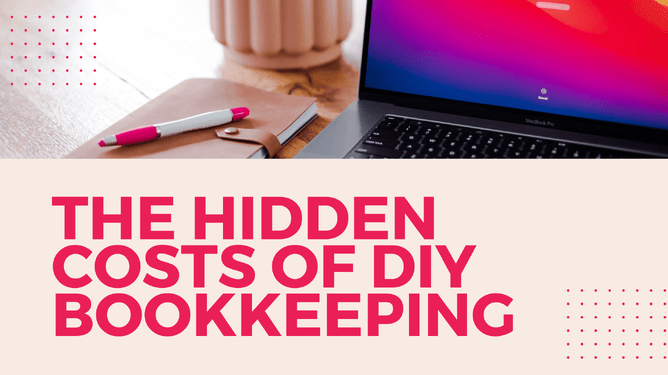Bookkeeping is one of those essential business tasks that keeps the wheels turning, but let’s be honest—it’s not why you got into business in the first place.
Many small business owners try to save money by handling their bookkeeping themselves. It might seem like a practical way to cut costs, but the reality is that DIY bookkeeping often comes with hidden expenses that can hurt your business in the long run.
Let's break down the real cost of DIY bookkeeping and show you why outsourcing could be the best financial decision you make for your business (and if you're still wondering if you even need a bookkeeper, start here!).
The Time Factor
Time is money, and as a business owner, your time is your most valuable asset. Every minute you spend entering receipts, reconciling accounts, or chasing invoices is time taken away from high-impact activities—like finding new clients, growing your business, or developing new products.
Here’s why your time matters:
Opportunity cost: What could you be doing instead of bookkeeping? Whether it’s developing strategies, networking, or simply relaxing, every minute spent on bookkeeping is a minute lost elsewhere. The opportunity cost can be huge.
Efficiency matters: Professional bookkeepers know the ins and outs of accounting software, tax rules, and financial processes. It may take you three hours to reconcile your accounts, but a skilled bookkeeper can do it in half the time—while ensuring accuracy.
Focus on growth: By delegating bookkeeping, you free up your time to focus on the tasks that drive growth. Instead of getting bogged down in spreadsheets, you can put your energy into the strategic aspects of your business.
The Risk of Errors: How Mistakes Cost You
Let’s be real—bookkeeping is complex, and mistakes happen. But in the world of finance, errors can be costly. The hidden costs of DIY bookkeeping errors can sneak up on you in surprising ways.
Common bookkeeping mistakes that can hurt your business:
Cash flow mismanagement: Inaccurate financial records make it difficult to get a clear picture of your cash flow. This can lead to over-spending or under-budgeting.
Late payments and penalties: DIY bookkeeping often means things fall through the cracks. Forgetting to pay bills on time, missing payroll deadlines, or filing taxes late can result in penalties and interest fees—unnecessary expenses that a professional bookkeeper would help you avoid.
The bottom line? Mistakes in bookkeeping can be costly. Whether it’s financial penalties, missed savings, or the risk of cash flow issues, these errors add up and hurt your business in ways you might not notice until it’s too late.
DIY Bookkeeping = Burnout
As a business owner, you wear many hats, but bookkeeping shouldn’t be one that leaves you feeling stressed and overwhelmed. The pressure to manage your finances accurately while also running your business can lead to burnout.
The stress of DIY bookkeeping can impact your business in several ways:
Decreased productivity: When you’re stressed about balancing the books, your focus on other tasks can suffer. Stress impacts your decision-making, creativity, and overall productivity.
Work-life balance: The time spent doing bookkeeping often spills into personal time. You might find yourself working late nights or weekends to keep up, cutting into time you should be spending with family or relaxing.
Increased risk of burnout: Constantly juggling administrative tasks like bookkeeping along with your other responsibilities can leave you feeling drained and burnt out. And when you’re burnt out, your business suffers too.
By outsourcing your bookkeeping, you can reduce the stress that comes with managing finances on top of everything else. Letting go of these tasks means you can focus on what you do best—running your business—without the constant worry about your books being in order.
The True Cost of DIY Bookkeeping
When you factor in time, errors, stress, and missed opportunities, DIY bookkeeping often ends up costing more than you think. While it may seem like a money-saving solution on the surface, the hidden costs can quickly add up—and they’re not always immediately visible.
Here’s what DIY bookkeeping could be costing you:
Time away from business growth activities.
Potential financial penalties from errors or missed payments.
Missed tax deductions or savings opportunities.
The toll on your mental well-being and work-life balance.
Inaccurate financial data leading to poor business decisions.
Why Outsourcing is the Smarter Option
By outsourcing your bookkeeping, you’re making an investment in the financial health of your business. A professional bookkeeper not only takes the burden off your shoulders but ensures that your finances are managed accurately, efficiently, and with an expert eye on potential savings and growth opportunities.
The benefits of outsourcing your bookkeeping include:
More time to focus on growth. Delegating your bookkeeping frees up time for high-impact tasks that actually drive your business forward.
Increased accuracy. A professional bookkeeper ensures your books are accurate, up-to-date, and compliant with regulations—eliminating costly errors.
Peace of mind. You can rest easy knowing that your finances are in good hands, allowing you to focus on running your business.
Don’t Let DIY Bookkeeping Hold You Back
Bookkeeping is critical to the success of your business, but that doesn’t mean you need to handle it yourself. The hidden costs of DIY bookkeeping—time, stress, errors, and missed opportunities—can outweigh any initial savings you might think you’re getting.
Instead, think of outsourcing your bookkeeping as an investment. With a professional handling your accounts, you’ll not only gain back valuable time but also ensure your finances are in the best possible shape for long-term growth.
Ready to stop juggling the numbers and start focusing on what matters? Let’s chat about how we can take bookkeeping off your plate.


